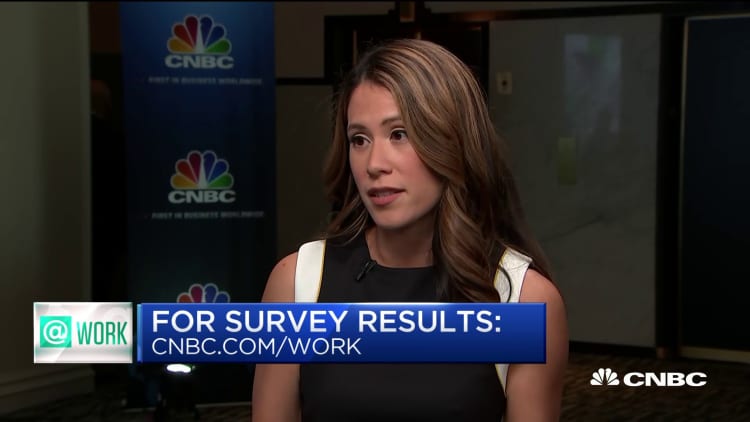Climbing the corporate ladder is core to the idea of an American capitalism that offers the opportunity for a high level of success to all, but it is currently failing many workers.
Forty percent of American workers are dissatisfied with the opportunities for advancement in their company, according to the latest CNBC/SurveyMonkey Workplace Happiness Survey. SurveyMonkey chief research officer Jon Cohen noted that of all the factors studied in the survey, this was the factor with which workers were most dissatisfied.
This finding was not shocking to Bud Bilanich, a business professor at the University of Denver and author of "Climbing the Corporate Ladder."
"I think that lots of people feel that they should have the opportunity to move up a little quicker so they get frustrated," Bilanich said. "I think [40%] is a high number, but it really doesn't surprise me."
In seeking out a promotion, workers were confident that having a strong work ethic was the most important factor. Twenty-four percent of respondents said working hard would be the most help in receiving a job upgrade. Networking (19%) and receiving an advanced degree (16%) rounded out the top three.
The CNBC/SurveyMonkey Workplace Happiness Survey was conducted from June 21–30, 2019, among a national sample of 7,940 workers in the U.S., with a margin of error +/-1.5 percentage points.
Bilanich said too many people believe hard work alone will open the doors.
"Everybody's working hard. Everybody's becoming an excellent performer. Working hard ... isn't going to be enough because your competition is also working hard and making contributions," Bilanich said. "To me, I think that hard work, and beyond hard work, the idea that your work has really produced some good, solid, measurable results for your company, is kind of like the price of admission."
For more on tech, transformation and the future of work, join CNBC at the @ Work: People + Machines Summit in San Francisco on November 4. Leaders from Dropbox, Sas, McKinsey and more will teach us how to balance the needs of today with the possibilities of tomorrow, and the winning strategies to compete.
Ben Brooks understood at a young age that getting the promotions he wanted required something beyond just doing his job well. Upon graduating from the University of Denver in 2004, he worked briefly at Lockheed Martin before settling down as a management consultant at Oliver Wyman. From there, he bounced around parent and sister companies racking up promotions along the way. By the age of 30, he was one rung below the C-suite level at Marsh, a risk management and insurance company with over $6 billion in annual revenue.
Brooks said the most important factor in getting these promotions was not hard work or networking, but simply being a strong advocate for himself.
"I asked for [the better job opportunities]," Brooks said. "I didn't wait to get sort-of tapped on the shoulder or selected or picked. I told people the job I wanted to have or the promotion I wanted to have and then I asked what I needed to do to get it, and then I did those things."
What people need to realize is that you don't move up automatically. There needs to be a vacancy and for that vacancy, there's probably going to be several people equally as qualified as you who are competing for it.Bud Bilanichbusiness professor at the University of Denver
Now, as an executive coach and founder of digital career training app PILOT, Brooks believes the traditional "corporate ladder" is starting to evolve. One of his clients, a Fortune 500 financial services company, recently reduced the number of levels between the lowest employee and the CEO to six. This shrunken ladder makes major promotions much less frequent, according to Brooks, since the spread was traditionally 10 or 15 levels.
Bud Bilanich, speaking from experience, said baby boomers staying in the workforce longer than previous generations are effectively "plugging up" many high-profile jobs. He said one of the main reasons for this is that baby boomers in general are much more educated than their parents, allowing them to take less physically-demanding corporate jobs. While Bilanich's father retired at age 62 after years of exhausting work in the steel mills, Bilanich, now in his upper 60s, does not see himself retiring until he is at least 75.
Trends like these can make promotions not only rare to come by, but also extremely competitive when the opportunities do arise.
"Too many of [my MBA students] were under the mistaken impression that as soon as they get their MBA that their company is going to promote them," Bilanich said. "What people need to realize is that you don't move up automatically. There needs to be a vacancy and for that vacancy, there's probably going to be several people equally as qualified as you who are competing for it. So you have to be able to find some way to stand out."
How to stand out
Both Bilanich and Brooks believe the factor that received the fewest votes is actually one of the most important for securing a promotion: Having a strong mentor.
"People don't highlight [mentorship] when given a list, but in fact it is kind of what really helped them move the needle," said Cohen.
The impact on workplace happiness is clear – nine in 10 workers with a mentor reported being happy with their jobs, while four in 10 without a mentor said they have considered quitting in the last three months.
However, Bilanich said the advantages go far beyond this.
"Being willing to say, 'Hey, I don't know it all, even though I'm a smart guy and I really work hard, but I really could benefit from learning from somebody else,' that's humility and I really do believe that humility goes a long way when it helps you to move up in an organization," he said.

Bilanich also stressed the importance of simply finding ways to get involved in a company, even if it's not always glamorous. When he was working for a very large pharmaceutical company early in his career, he volunteered to run his company's United Way fundraising program. He said the job was often dreaded among employees since no one wanted to ask coworkers for money. However, by nature of the job, he was able to meet face-to-face with many of the company's senior-level executives which paid off enormously for him.
"As a direct result of that, I actually got a promotion because one of the presidents of one of the divisions really was impressed by the presentation I gave and the way I handled the questions, that he ended up offering me a job in his division," Bilanich said.
While much attention is given to the ways managers take care of employees in the workplace, Brooks believes his efforts to take care of his managers played a vital role in his promotions as well.
"I was focused on their success, and when they succeeded, I succeeded," Brooks said. "So it was really this psychological contract of, 'I'll take care of them, so they'll take care of me.'"
Still, with the retirement age rising and promotion opportunities becoming increasingly rare, Brooks is urging employees to change the way they think about climbing the corporate ladder. Instead of attending networking events and passing out as many business cards as possible, Brooks is advising workers to focus more on cultivating deeper, stronger working relationships. And even if a new responsibility at a job doesn't bring a new title with it, he believes every change should be looked at as an opportunity for career advancement, whether it be through meeting new people or seeking out other personal development opportunities.






